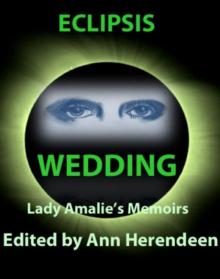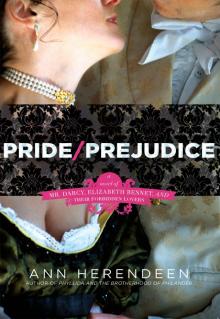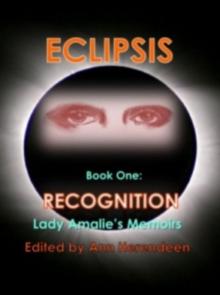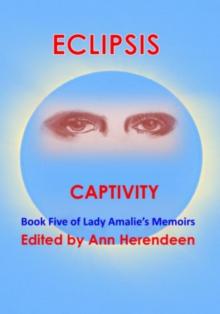- Home
- Ann Herendeen
Pride / Prejudice
Pride / Prejudice Read online
Pride/Prejudice
Ann Herendeen
To all the friends I made through my first novel,
Phyllida and the Brotherhood of Philander:
especially Tarra T. Thomas and Karyn R. Pierce,
who accompanied me on so much of this journey,
and Helen and Tom, who inspired me both in
my writing and in my life; and to my father,
Walter Barton (Bart) Herendeen, who would have
enjoyed Phyllida, not only because I wrote it,
but because, as I recognized far too late, we shared
the same dark outlook and sick sense of humor.
This one’s for you.
a cognizant original v5 release october 06 2010
Contents
One
“IT IS A truth universally acknowledged,” Fitz said, “that a…
Two
UNFORTUNATELY FOR FITZ’S resolve, the situation improved, in a dangerous…
Three
ELIZABETH BENNET WATCHED her sister sleep, recalling the past days’…
Four
NOW THAT SHE was awake, Jane asked Elizabeth, with great…
Five
“GEORGE WICKHAM!” CHARLES said. “I don’t know how he has…
Six
MISS BINGLEY KNOCKED on Fitz’s door a short time after…
Seven
CHARLES INSPECTED HIS face in the looking glass. Rather peaked,…
Eight
IT WAS EASY enough, Elizabeth decided, after suffering a few…
Nine
CHARLES BLOTTED THE paper again and swore, saw Georgiana in…
Ten
AFTER HIS FIRST visit, Fitz was unable to deprive himself…
Eleven
“WHAT EXACTLY IS wrong with this Miss Bend-over?” Monkton said…
Twelve
THERE WAS NO more gloating now, Elizabeth thought. How her…
Thirteen
“SHALL WE ASK your cousin, colonel,” Elizabeth said in response…
Fourteen
“I THINK HE’S in love with you,” Charlotte said. The…
Fifteen
THE PEN BIT into the paper so hard it tore…
Sixteen
“I REALLY AM sorry, Jane,” Elizabeth said. “I didn’t want…
Seventeen
“GOD, DARCY, WE will miss you,” Monkton said, lifting his…
Eighteen
GEORGIANA DARCY SCRATCHED at the door of her brother’s dressing…
Nineteen
“NOW I UNDERSTAND,” Elizabeth said. “Only now, after seeing his…
Twenty
WHERE WAS PROVIDENCE now? George wondered. How had all his…
Twenty-One
FITZ AND CHARLES rode slowly home after the dinner at…
Twenty-Two
“SO, DARCY, MRS. Collins tells me you are to be wed.”
Twenty-Three
“MR. DARCY?”
Twenty-Four
TWO WEEKS LATER, two wedding parties shared a feast at…
Twenty-Five
IN A ROOM just along the corridor, Charles embraced his…
Twenty-Six
FITZ RODE OUT early one morning, three weeks into his…
Twenty-Seven
ELIZABETH SAW HER husband reading a book at breakfast instead…
Twenty-Eight
THE REUNION OF the two sisters was loud, and entailed…
Twenty-Nine
ELIZABETH AND JANE sat in the nursery at Pemberley. The…
Thirty
LADY CATHERINE STOOD over the bed, turning the rings on…
The Story Behind
Bibliography
Acknowledgments
About the Author
Other Books by Ann Herendeen
Credits
Copyright
About the Publisher
One
“IT IS A truth universally acknowledged,” Fitz said, “that a single man in possession of a good fortune is in want of a wife.”
Charles blinked and sat up. “Lord, Fitz! It’s the middle of the night. What do you expect me to make of that? Sounds like another of your epigrams.”
“I suppose it is,” Fitz said. “But its meaning does not seem particularly obscure.”
“You and Caroline going to tie the knot at last? You sly dog.”
Fitz grimaced and pulled Charles back down beside him. “My dear,” he said, “you have a tendency to levity that, like any disproportion, can be tedious in excess.”
“And you,” Charles said, “have a way of talking to people as if you were a judge and they the prisoner in the dock.”
“Guilty as charged,” Fitz said, bestowing a kiss on the pouting lips. “My great uncle might have been pleased at my following his example. Now, what shall my penalty be? I know.” He trailed his hand down Charles’s slender body until he found what he was searching for, held tight and squeezed.
Charles groaned and arched his back. “God, Fitz, you’re a devil. I wish you’d—”
“Don’t talk,” Fitz said. He moved lower in the bed, opened his mouth, and paid his forfeit with an alacrity bordering dangerously on enthusiasm. He would consider it deplorable if he were not motivated by love. Love of the purest kind.
THEY WOKE TO dawn light. “I’m only leasing the place,” Charles said, picking up the argument as if there had been no interruption. “I haven’t committed to anything permanent—a few months’ tenancy, a year at most.”
“The minute you take possession of the house,” Fitz said, still groggy from sleep, “nay, the minute you ride into the village, you will be besieged by every fortune-hunting mama and her brood of hideous, squinting, gap-toothed, caterwauling daughters.”
“How do you know they will be hideous?” Charles asked. “Or are all women hideous if you think I might find them agreeable?”
“In a way, yes,” Fitz said, attempting a lightness of tone he could never feel on this subject. “You are modest in your assessment of your own charms, and too easily flattered by the pitiful arts of any barely respectable female.”
“My word,” Charles said. “You have a low opinion of my understanding. For someone who calls himself my friend—”
Fitz saw he had wounded where he had hoped merely to inspire wariness. “My dear,” he said, kissing the cheek that presented itself as he approached the lips, and stroking the soft brown hair. “I don’t question your intellect, merely your judgment, and only on this subject; one that has proven difficult for the wisest philosophers to master, back to antiquity, much less an English gentleman of twenty-two.”
“Whereas from the vast experience of twenty-seven, all is revealed,” Charles said.
“Twenty-eight, last month,” Fitz said. “It is not my age but my temperament that gives me an advantage. I do not immediately assume, because a woman simpers and plies her fan, that she is in love with me, or I with her.”
“At last the truth comes out,” Charles said. “You don’t like women. I’ve suspected it all along.”
“Really?” Fitz said. “In other words, because I show some taste and discrimination, I am supposed not to care for women in general.”
Fitz’s voice had entered that supercilious register that ordinarily would have led Charles to concede the debate. This time he persevered. “When have you ever looked at a woman but to find fault? As far as marriage is concerned, my fundament is as close to a wife as you’ll ever come.”
“Don’t be coarse, Charles,” Fitz said. “If you believe that’s all you are to me, your understanding is worse than I thought.”
“Deny it all you like,” Charles said. “But I begin to pity Caroline.”
“And what, may I
ask, has your sister to do with this conversation?”
“I am not to be coarse,” Charles said, “but you are allowed to be dense. We’ve talked it over a hundred times. You’re to marry Caroline and I’m to marry Georgiana—double brothers-in-law.” He shrank back, seeing the truly alarming expression distorting the features of his friend’s handsome face.
“Do not,” Fitz said, “I repeat, do not bring my sister’s name into this bed.”
“Why not?” Charles said. “You think she’s too good for me? I notice you don’t scruple to pollute yourself.”
Fitz caught himself on the verge of losing his temper and took several deep breaths. Why was it that this subject always upset him, when he knew it was inevitable? “I’m sorry, Charles,” he said. “You see, Georgiana is just turned sixteen. With the difference in our ages, and especially since our father died, I am more of a parent to her than a brother.”
Charles laid his hand on his friend’s muscular chest. “I understand, Fitz. I’m sorry too. I just think you’re making too much of this business. You know my father wanted to purchase an estate but died before he could accomplish it. It’s the least I can do to follow through on his intentions. You may sneer, from your lofty perch atop the greatest property in Derbyshire—which, you may recall, you inherited—but I, like Lack-land, must start from nothing—although I hope I’ll do better than King John.”
“You could do a lot worse than the Magna Carta,” Fitz said.
Charles laughed dutifully. “I’m not rushing into anything. Surely you agree I’m behaving with all the circumspection and prudence you could require.”
“My dear boy,” Fitz said. “I agree that you think you are. You can’t help it that you fell in love with the first house you saw with sufficient rooms, just as you fall in love with every woman who possesses all her teeth and whose hair retains its natural color.” He rolled over on Charles, pinning him to the mattress with his larger, heavier form, and kissed him until he gasped for air.
“Brute,” Charles said when he was allowed to breathe. “Overbearing, domineering brute.” He licked his lips, moving his tongue in a slow circling motion. “Kiss me again, brute.”
“If you’re going to tease me like that,” Fitz said, “I shall be obliged to do more than kiss you.”
“Mmm,” Charles said, “I was hoping you’d say that. Just try to take it easy. I want to ride over and look at the place today.”
“I will be as gentle with you,” Fitz said, “as with a woman.”
“Lord help me!” Charles said. “I’m a goner. I won’t be able to sit for a week.”
And yet, a few hours later, as Charles Bingley rode through the village of Meryton to the manor house of Netherfield Park, he was permeated with a great sense of well-being. Fitz had allowed him to go alone, and to make all the arrangements without interference. “You are no longer the untried youth of our first acquaintance, but are on your way to becoming a man,” he said. “I’ve known it for some time now. Bear with me if on occasion I find the transformation difficult to accept.”
“Of course I will,” Charles said. “Indeed, I hope—that is—I don’t want to give up being your dear boy entirely.”
The animation that this speech produced in Fitz’s austere face and hard body almost led to a repetition of the dawn’s activities, until the advancing hour and the possibility of the entrance of servants with shaving water brought things to an abrupt and unsatisfying conclusion.
“Tonight,” Charles said, “I will tell you all about it, and you can criticize my decisions and inform me as to how much better you would have managed the business.”
“How disagreeable I must be, to be sure,” Fitz said. “I wonder you don’t take the first chance to marry and seize your freedom.”
“I could never be completely free,” Charles said. “Just give me credit for some maturity.”
“Isn’t that what this tiresome conversation has established?” Fitz said, but smiling. “Go on, then. Sign the lease on your manor and invite every female in the neighborhood to a ball. I won’t say a word.”
“I will hold you to that, Fitz,” Charles said. He just might, at that. A ball to celebrate the establishment of his own household. And if he met a pleasant, pretty young lady or two, where was the harm in that? He would have to marry sooner or later, however Fitz jibbed at every mention of the subject. In fact, it might be very nice to have a wife. But he would do nothing rash, nothing to make Fitz jealous or unhappy. The man had the devil’s own temper, but he was the truest friend, and there was no doubt he had Charles’s interests at heart. And he made love like—like a demon and an angel, both, in one body.
Charles sighed and dismounted in front of the house. It was well kept, in good condition, only recently vacated. He could be happy here. He was sure of it.
THAT FIRST BALL in the Meryton assembly rooms lingered in Fitzwilliam Darcy’s late-night torments for weeks. It had all gone as he had foreseen. Every family in the neighborhood had made a point of calling on Charles as soon as he moved in—even before. “I scarcely had my furniture unloaded and my trunks unpacked,” he remarked in his cheerful, uncomplaining way, “when the local squires began riding up to ‘get acquainted,’ as they said.”
The ball reflected the fruits of their labor, all the gentry for miles around attending, and worse, all the dreary, middling sort of people, the attorneys and the merchants, anyone who had acquired sufficient capital to retire from business or buy a tiny plot of land and could now call himself a gentleman. That in itself was bad enough, but naturally they all had families, and for some reason their progeny ran to daughters—at least that’s how it looked to Fitz.
“My goodness!” Caroline Bingley said, gliding up to take his arm. “It’s like a scene from some disreputable opera.”
For once Fitz was in agreement, and grateful for her protection. He could only be thankful that he had had the good sense to stay in town until the previous evening and had not had a chance to be introduced to anyone; he could therefore claim to be unable to ask any of this enormous local harem to dance.
Charles was already dangerously entangled, with a plump, glowing girl, all smiles and lush curves, just the sort that would be considered the beauty of this benighted backwater. In London, of course, she’d be dismissed as a country milkmaid, but Charles conversed so spiritedly with her during the dance, and was on the verge of claiming her for an ill-advised second set, that Fitz attempted to intervene.
“Quite a prize, eh?” A vacuous old tradesman who had been elevated to the rank of knight took hold of Fitz’s arm as he stepped forward to put a word in Charles’s ear.
“I beg your pardon?” Fitz said, lowering his eyelids with disdain at the man’s coarse, red face.
“Miss Bennet,” Sir William Lucas said. “Our own native rose, you know. It seems your friend hasn’t wasted any time. We may see some interesting developments soon, eh, what?”
Fighting the urge to plant the mushroom a facer, Fitz turned away and almost collided with Charles. “Not dancing, Fitz? How can you be so stupid?”
Fitz shrugged. “You are dancing with the only handsome girl in the room, other than your sisters.”
“Oh, Miss Bennet is the most beautiful creature I ever beheld!” Charles exclaimed, his voice unnecessarily loud over the thin strains of music from the small orchestra. “But there’s her sister forced to sit down, and almost as pretty. Why not ask her?”
Despite his best efforts, Fitz couldn’t help sliding his eyes in the direction of the seated girl, curious as to how the sister of a country beauty would appear—buck teeth, perhaps, or a giggler, or spotty—and by the worst of bad luck his eyes met hers as, sensing his covert scrutiny, she turned her head toward his side of the room. Wide, dark brown eyes, fringed with delicate lashes; expressive, humorous eyes, yet earnest; lively but honest. Gentle and innocent as a doe’s but with the wit of a philosopher. Playful and seductive as a kitten’s but with humanity and Christian grace to temper
any impropriety…
Fitz felt himself blushing like a schoolboy, frowned, and looked away. By God! He would not be made a fool of! “I’m afraid she is not handsome enough to tempt me,” he said, ashamed of the words as soon as they left his mouth. “You had much better return to your charming partner and leave me to my uncharitable solitude.” He watched Charles follow his advice, annoyed at being obeyed so promptly, and became aware of Caroline standing nearby, apparently having witnessed the entire disgraceful incident.
“Miss Bingley,” Fitz said, giving a slight bow and attempting a smile. “Will you do me the honor?”
“Why, Mr. Darcy,” she said, “I worried, for one breathless moment, that Cupid’s arrow had pierced your heart.”
“What the de—I mean, whatever are you talking about?” Fitz said.
“But then I recalled,” Caroline continued, “that you do not possess a heart to be wounded.”
Fitz was grinding his teeth as he led her out to form the quadrille.
THAT NIGHT WAS pure torture, and only the fact that mortals rarely possess the gift of foresight, and Fitz could not, thankfully, anticipate that worse was to follow, allowed him to bear his trials with gentlemanly composure.
“Wasn’t it splendid!” Charles said, standing so temptingly naked in the center of the bedroom, arms outflung in rapture, twirling slowly and tilting his head up to stare for some reason at the ceiling.
“Very nice,” Fitz said.
“Nice?” Charles repeated. “Nice? That is the most mewling, pathetic, inadequate word in the English language. The ball shall be anything you say, except nice.”

 Birth: A Novella
Birth: A Novella Wedding
Wedding Pride / Prejudice
Pride / Prejudice Recognition
Recognition Captivity
Captivity